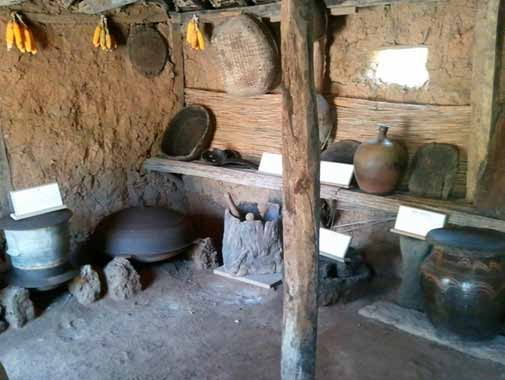 | ▲Jeju Olle (Credit to Korea Tourism Organization) |
|
In Jeju’s system of household gods, known as “ilbansin” (“ga-sin” in mainland Korea), the kitchen goddess Jowang Halmang stands out. There are some who believe that the worship of Jowang Halmang actually precedes and forms the basis of the ancestor worship integral to Korean society. In fact, this hearth goddess was worshipped throughout the Korean peninsula in addition to Jeju Island – but rather than originating from mainland to island, it is quite possibly the other way around, as the origins of the Jowang myth are found in the Munjeon Bonpuri (myth) of Jeju.
The bonpuri tells the tale of Yeosan Buin, the impoverished woman who became Jowang Halmang, her husband and 7 sons. Through her craft, she gathered valuable materials and sent her husband to the market so that he might sell them for profit. Along the way, he met an evil woman, Noiljeodae, who tricked and seduced him into making her his second wife, whereby he lost all of his possessions.
Noiljeodae then made him leave her home and reside in a shed where she fed him the rough grains of animals, a diet that weakened both his body and mind and rendered him blind.
Yeosan Buin, worried for her husband so long gone, searched and found him. She fed and clothed him, intending to take him home again. Along the way, however, she too was overtaken and tricked by Noiljeodae who, convincing Yeosan Buin to bathe together with her in a pond, drowned her instead. Noiljeodae, disguised in the attire of Yeosan Buin, returned with the blind husband to their home and set out to kill all of the sons. She faked an illness, then disguised herself as a fortuneteller whereby she declared that the only cure for her illness was the livers of her 7 sons. She is the classic wicked stepmother of the world’s fairy-tales – and, a cautionary tale for secondary wives in Jeju’s then-polygamist society.
The youngest son was suspicious of the forture teller (the youngest son or daughter often thought to be the wise one, in Jeju and world mythology), and fed her boar’s liver instead. Upon her ‘cure’ which revealed her deception, she hanged herself in the outhouse. She became the ghost of this area, the most dangerous household deity who must be appeased. Yeosan Buin’s bones were then discovered in the pond by her sons, who removed them from the water, laid out her skeleton properly, and threshed it with branches of a medicinal tree known for its tranquilizing effects. They molded clay onto her bones in order that it might become flesh, then fashioned a bamboo rice steamer for which each son poked a hole in the bottom (traditional rice steamers having 7 holes), exhorting the spirit of their mother to sit in the rice steamer and warm herself.
Soonie Kim, a Jeju native, is a mythologist and a Jeju representative of the nation’s Cultural Heritage Administration. Anne Hilty is a cultural health psychologist from New York who now resides in Jeju Island. Interpretation/translation was provided by Youngsook Han, a Jeju native and instructor at Jeju National University.
From Jeju Weekly | 



